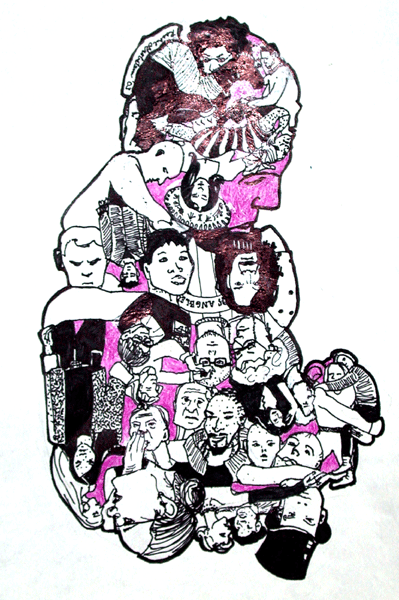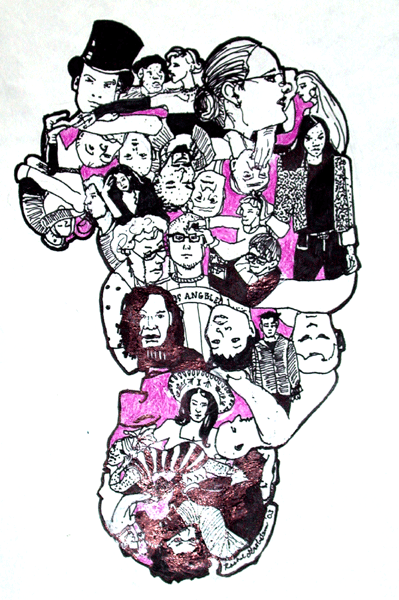Made available on Serendip
In association with Making Sense of Diversity: An Exploration, a world wide conversation
Emily opened the discussion by describing the desire for "mutal empowerment"in the classroom. Linda-Susan spoke of the "generation gap," the "intergenerational dynamics" that arise from the "difference in frames of reference" between faculty and students. Students have a "hunger for the new"; they are not interested in what is "fossilized." The "hierarchy of what constitutes significant knowledge" is a challenge to each of us to be more flexible in our own stubborn attachments to the allusive systems with which we are most familiar.
The discussion turned quickly to the question of whether students wanted "touchy-feely" classes, and what pedagogical function it serves for students to "take a field trip in their heads," to bring what they know to their courses. It was claimed that "academic" knowledge, by definition, lacks passionate conviction, that "political science" (for instance) "is not political." The counter-argument was posed, that "every field has the scope" for a student not only to "be the recipient," but the contributor to knowledge: this is "not about the thing itself," but rather about how people learn, about the interaction. Why would anyone be invested in a process of teaching and learning that is not about "opening up"? Even science is not just about "hurling facts."
An experiment was described in which literature professors enrolled in a science course, and science professors a literature course. The former reported on a "totalitarian experience," with no space for discussion about the implications of the work being done; the latter felt that their experience lacked "cohesiveness," that there was no valid guidance in interpreting the material covered in the class. There ARE different attitudes toward learning; people like these divides, and identify with one or the other. Students and their teachers are also pressured by forces beyond school to "get where they want to go": the demands of the MCAT, of the standards set by the American Chemical Society, of demands by industry for certain lab skills all run counter to "natural tendencies" to teach and learn in certain ways.
Are there reasons for giving efficient presentations of knowledge? Why is it good, pedagogically, to make students think, not just to receive knowledge? If students bring something to the table and are practically involved in their courses, they can acquire the material better. "I speak from experience," and analysis must always come from there. But then you can't "cover it all." What are the values here: participatory? proactive? critical? Is there a consensus that the goal is to enable critical thinking? Might critical thinking interfere with certain other forms of self-actualization (such as creative writing--or a job in the chemical industry)?
"People hide behind their knowledge." Why aren't they passionate about what they are learning? "I think it should matter to other students how it hits them." Can teachers care TOO much that their students have an emotional investment in the knowledge being covered in the course? Are we trying to "control the destination and the itinerary," when we say what is allowable, what not, in a classroom conversation? Some of us have a "tendency to overshare." Whose responsibility is it to decide whether something might be of value to others? Is it the job of the teacher to be the "alchemist," to make use of what is said by each student, who contributes as she feels called to do? Is it the job of each student, to make what use she can of what is offered by others? Or is it the job of the speaker, to ask whether what she brings, as quintessential to herself, will be of use to others? In what ways can we all be more respectful of that process? We need to develop a sympathetic understanding of others, learn to put ourselves in their shoes, and see things in the ways they do (history teaches this: we see those who live in the past as strangers, and need to be led into their heads, to learn to emphatize with them). BUT: personal sharing can also shut off learning; it can function as a conversation-stopper, as a testimony that prevents others from challenging and "pushing back."
Why is it educationally significant to "be in another's head," to inhabit some of the same space? Because it cuts down on warfare. Let us not be afraid, however, to "push back," to let "love" prevent us from asking questions about "truth" (echoes here of earlier conversations about our preference for "niceness"). Can we make a coalition among ourselves, to engage in a rigorous use of this kind of sensibility?
This discussion invited to continue on line.
"Making Sense of Diversity" will resume in person at noon on Friday, November 5, when Paula Arboleda, Alnisa Bell, Li-Chen Chin, Lauren Friedman and Nia Turner will give a "Report from South Africa
."
| Return to Schedule for Friday Noon Conversations
| Forum
| Bryn Mawr Conversation
| General Conversation
| Serendip Home |
These pages are being maintained by Christina Florio, with support from Audrey Flattes and Nia Turner and sponsored by the Bryn Mawr College Center for Science and Society and the Serendip website. Send us additional comments or suggestions at Serendip
© by Serendip 1994-2004 - Last Modified:
Saturday, 23-Oct-2004 15:28:23 EDT

